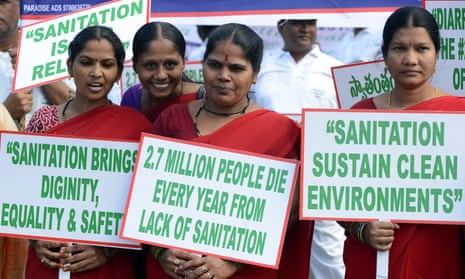1. Make toilets a status symbol
We have to make toilets sexy so that people want to have them. When you say “toilet” people often think of dark, dirty and smelly places. Instead, we need them to think of toilets as rooms of happiness – clean, colourful and not smelly. Rational approaches have limited impact on behaviour change. Although they can serve as justification for choice, people primarily make decisions based on aspirations and justify their decisions rationally afterwards. Jack Sim, founder, World Toilet Organization
2. Change the vocabulary
Let’s make the conversation more accessible by saying what we mean. Even among those working in the field, we constantly hide behind clean-sounding words like sanitation, latrine, Wash [water sanitation and hygiene], open defecation. These words don’t mean anything to the masses, so how can we drive action if we can’t even talk about what we are doing? Let’s replace words like sanitation and open defecation with toilets and shitting outside. Kanika Thakar, founder, #ToiletTalk
3. Start with health
Disease transmission and other risks are associated with open defecation. People need to understand the worth of investing in toilets in terms of the health benefits. This is not feasible without supportive policies and a market environment, and cannot increase demand for sanitation alone. That requires a combination of factors. Kariuki Mugo, country programme manager, WSUP
4. Try a community-led approach
It is not a silver bullet, but some of our country programmes have had success in applying the community-led total sanitation (CLTS) approach. As far as we can see, the key is to ensure it is really community-driven, which can be tricky when CLTS becomes government policy. Governments might feel pressured to push communities into being open defecation-free (ODF), rather than it being a real journey of community learning. Carolien van der Voorden, senior programme officer, Global Sanitation Fund, WSSCC
5. Don’t count the loos
There are pockets of changes in India in certain states where they have realised that the focus should be on counting open defecation-free communities, and not toilets. The previous supply-driven approach has resulted in graveyards of toilets, where they are used as storage. Mayuri Bhattacharjee, founder and chief executive, Loo Watch
6. Make the case to governments
The best way to encourage governments is when populations demand it. Somehow this creates a vicious cycle, but one that could be made virtuous. In the shorter term, if sanitation becomes a priority for donors, development banks and NGOs, it will also influence government priorities. We need to be better at making the case that it’s a great investment, with tremendous return (five to one), due to the impacts on public health, education, gender, and dignity. For local governments, it is key they see that delivering on sanitationmight help them win their next elections. Andrés Hueso, senior policy analyst, sanitation, WaterAid
7. Encourage hand-washing
We see hygiene and sanitation messages as linked, especially the need for systematic hand-washing with soap or ash. Not defecating in the open, keeping toilets fly-proof, and washing hands after using the toilet and before preparing food are the three key indicators for declaring a community ODF. But systematic handwashing is a more difficult habit to create, and we’re working with the London School of Hygiene and Tropical Medicine in Nigeria to test the addition of emotional triggers to the normal CLTS approach. Carolien van der Voorden
8. Support sustainable programmes
It’s a very unsexy area, but maybe if more people start asking DfID and other donors about how they are supporting the sustainability of these programmes, they might change their reporting rather than just focus on toilet building. I have noticed that Oxfam have added “fix a well” to their list of gifts this year, which is great, but I wait for the day when I can gift “empty a pit latrine” to my family. Katrina Charles, co-director, Reach, University of Oxford
9. Don’t rely on business
Pit-emptying and sludge transportation are the two links in the sanitation chain with the most business potential for the private sector, but there is no single case of profit-driven sanitation success at scale, not even in developed countries. If markets have not delivered sanitation in the past, that is for a reason. While the private sector and markets have a big role to play, we need to be very clear: sanitation is profitable from a public health and dignity perspective, and it requires public investment. Andrés Hueso
10. Teach poo as a resource
If you do CLTS first, you teach disgust of the shit and I don’t think you can unteach it, so then there are problems with using biogas and other things that come from it. If you teach poo as a resource first you can motivate people to bring their shit to you and then teach hygiene later. This is highly culture-specific but open defecation is not just about desirable toilets. We need to support sanitation chains to make shit valuable enough for someone to come and collect it. Until we can empty them, toilets won’t be sustainable and people will keep using open defecation rather than a full-pit latrine. Katrina Charles
Read the full Q&A here.
Join our community of development professionals and humanitarians. Follow @GuardianGDP on Twitter, and have your say on issues around water in development using #H2Oideas.

Comments (…)
Sign in or create your Guardian account to join the discussion